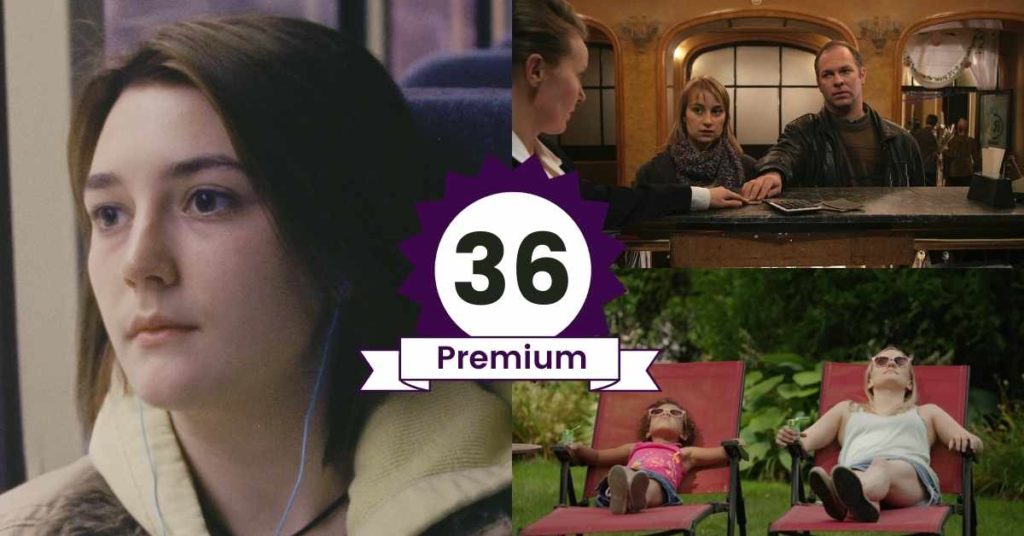Inspired by Eliza Hittman’s new drama, Never Rarely Sometimes Always, we discuss various depictions of abortion on screen ranging from this year’s Saint Frances to Obvious Child and 4 Months, 3 Weeks, and 2 Days. For this discussion, Editor-in-Chief Alex Heeney is joined by Executive Editor Orla Smith and guest Lindsay Pugh of Woman in Revolt.
This episode is a Seventh Row members exclusive, as are all episodes older than six months. Click here to become a member.

Eliza Hittman’s third feature, Never Rarely Sometimes Always (2020), is a quiet drama about seventeen-year-old Autumn (Sidney Flanigan), who lives in rural Pennsylvania, and must travel to New York City for an abortion. With the help of her cousin, Skylar (Talia Ryder), Autumn heads to the big city only to discover that the procedure will take longer than expected, and she can’t afford a hotel or food. Hittman follows the two girls over a few days as they deal with the process of getting an abortion. Along the way, they meet a creepy boy on the bus (Théodore Pellerin) who uses them and whom they use in return for money they desperately need.
Both Never Rarely Sometimes Always (2007) and Cristian Mungiu’s Palme-d’Or-winning drama, 4 Months, 3 Weeks, and 2 Days, deal with the excruciating process of getting an abortion in a world where it’s not easily accessible — or in fact, illegal. Neither film is particularly interested in how the women got pregnant, focusing instead on the aftermath of how they deal with it. In Never Rarely Sometimes Always, Autumn encounters a series of kind and empathetic women at Planned Parenthood who help her come to terms with her abusive relationships and support her through her decision. By contrast, in 4 Months, 3 Weeks, and 2 Days, Otilia (Anamaria Marinca) and her pregnant friend Gabita (Laura Vasiliu) deal almost exclusively with manipulative and abusive men. The characters in both films are working class and struggle to gain access to abortions in part because of their lack of class privilege.
On the opposite end of the spectrum when it comes to storytelling about abortion are the dramedies Saint Frances (2018) and Obvious Child (2014). Both films are about a thirtysomething woman who gets unexpectedly pregnant after a one-night stand and chooses to have an abortion. Obvious Child takes place in the lead-up to and direct aftermath of the abortion, while the abortion kicks off the action in Saint Frances. Both films are more about their respective protagonist’s struggle to grow up emotionally while dealing with precarious employment. Both are set in the big city (Chicago and New York) which makes access to abortion easy, and the women have the kind of class privilege that makes this an easy and obvious solution.
We also discuss other depictions of abortion on screen, including the films Vera Drake, Portrait of a Lady on Fire, and Grandma, and TV episodes of Please Like Me, Crazy Ex-Girlfriend, and Sex Education. We also discuss the differences in approaches to telling stories about abortion on screen, the kinds of characters these stories tend to be about, and how depictions of abortion on screen have changed over the years.
*Editor’s note: The Golden Girls connection that Lindsay Pugh was referring to was that its creator, Susan Harris, also wrote the abortion episode of Maude; both shows star Bea Arthur.
Show notes and recommended reading
- Read Alex Heeney’s interview with Eliza Hittman on Beach Rats
- Listen to our previous episode on film criticism featuring Lindsay Pugh
- Read Lena Wilson’s interview with Hittman on Never Rarely Sometimes Always
- Read Alex Heeney’s review of Obvious Child
- Read Alex Heeney’s interview with Cristian Mungiu (director of 4 Months, 3 Weeks, and 2 Days) on Graduation
- Read our interview with the filmmakers of The Body Remembers When the World Broke Open. Read Brett Pardy’s review of the film.
- Read Alex Heeney’s review of Grandma
- Read about Emile Weaver in Elle Magazine.
- Read Justine Smith’s profile of Théodore Pellerin in The 2019 Canadian Cinema Yearbook.
- Buy our book on Mike Leigh, Peterloo in Process, for interviews with costume designer Jacqueline Durran and cinematographer Dick Pope that touch on their work on Vera Drake.
- Buy our book Portraits of resistance: The cinema of Céline Sciamma in which multiple essays discuss the importance of depicting abortion in Portrait of a Lady on Fire for the film’s feminist message.
- The intro and outro music for this episode is “Bus to New York” from Julia Holter’s Never Rarely Sometimes Always score
Films and TV shows discussed & where to find them
| Film | Stream | Rent |
|---|---|---|
| Obvious Child | 🇺🇸 Netflix, Hoopla, Kanopy 🇨🇦Hoopla | 🇺🇸🇨🇦🇬🇧 iTunes, 🇺🇸🇨🇦 Google Play, YouTube 🇺🇸🇬🇧 Amazon 🇺🇸Vudu |
| 4 Months, 3 Weeks, 2 Days | 🇺🇸🇨🇦 Criterion Channel | 🇺🇸🇨🇦🇬🇧 iTunes, 🇺🇸 Amazon, Vudu |
| The Body Remembers When the World Broke Open | 🇺🇸🇨🇦🇬🇧🇦🇺 Netflix | |
| Saint Frances | Oscilloscope ‘Virtual Cinemas’ | |
| Never Rarely Sometimes Always | 🇺🇸🇨🇦 Premium VOD | |
| Please Like Me | 🇺🇸🇨🇦🇬🇧🇦🇺 Netflix | |
| Crazy Ex-Girlfriend | 🇺🇸🇨🇦🇬🇧🇦🇺 Netflix | |
| Sex Education | 🇺🇸🇨🇦🇬🇧🇦🇺 Netflix | |
| Grandma | 🇨🇦 Prime Video 🇺🇸Starz 🇺🇸🇨🇦Tubi | 🇺🇸🇨🇦🇬🇧🇦🇺 iTunes, 🇺🇸🇨🇦🇬🇧🇦🇺 Google Play, YouTube |
| Vera Drake | 🇦🇺 SBS Movies | |
| Lucia, Before and After | Watch for free here. |

